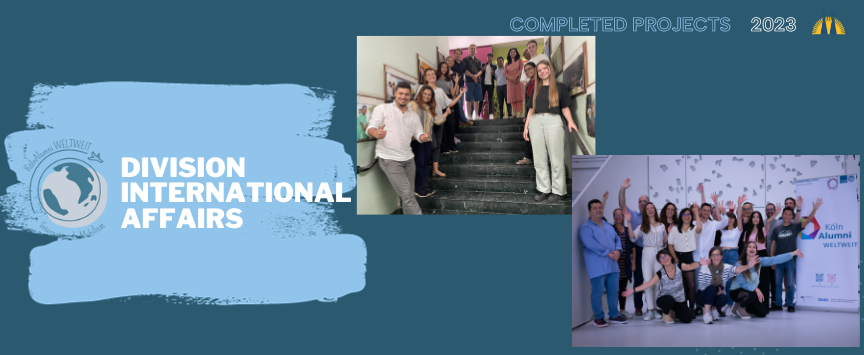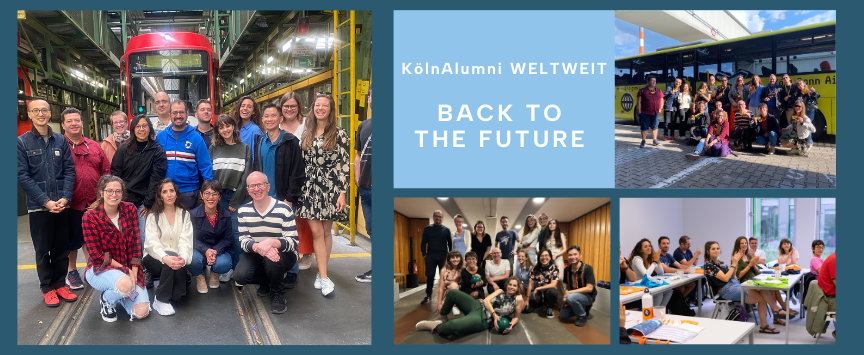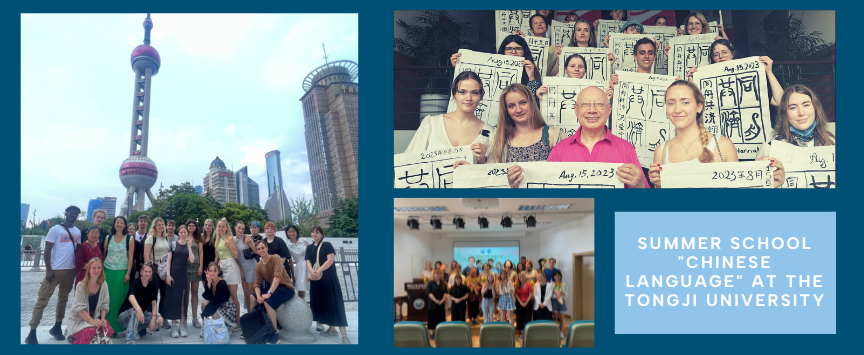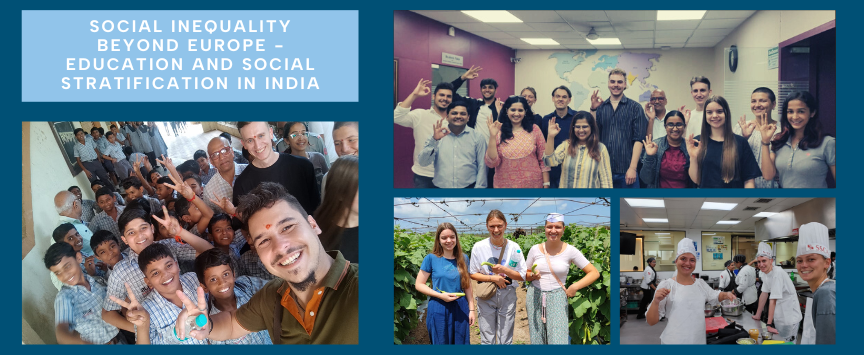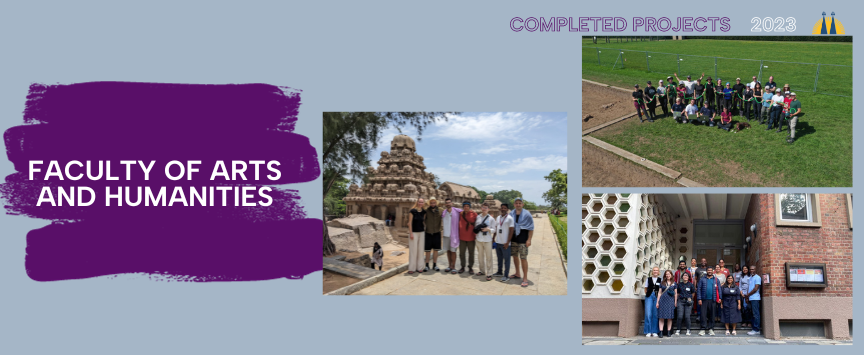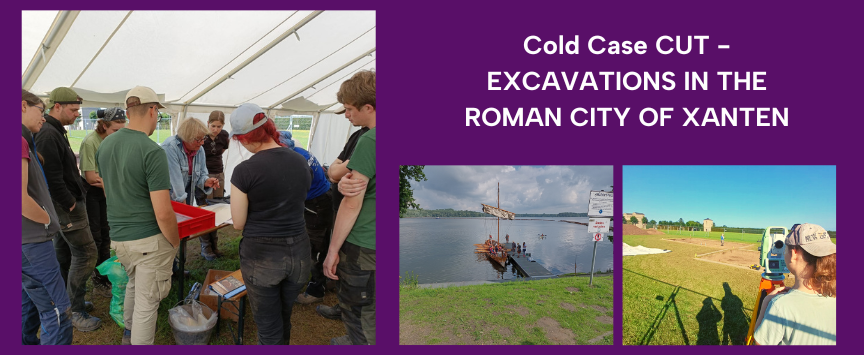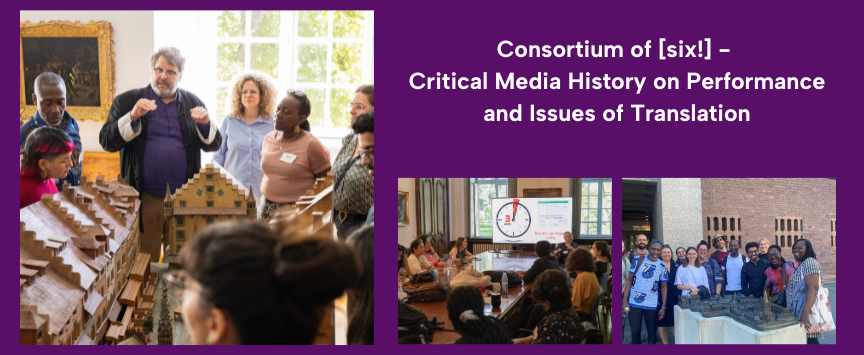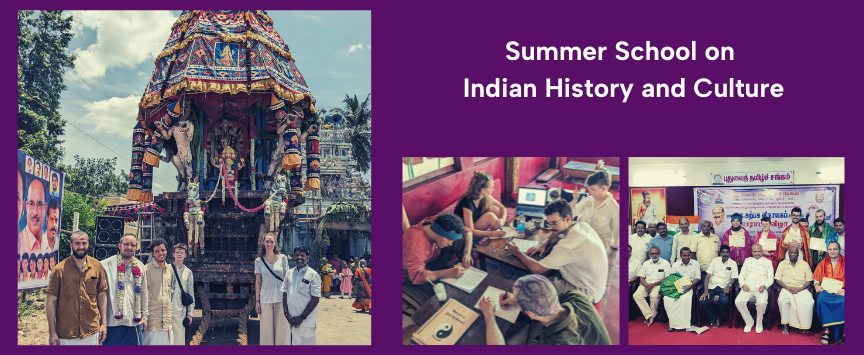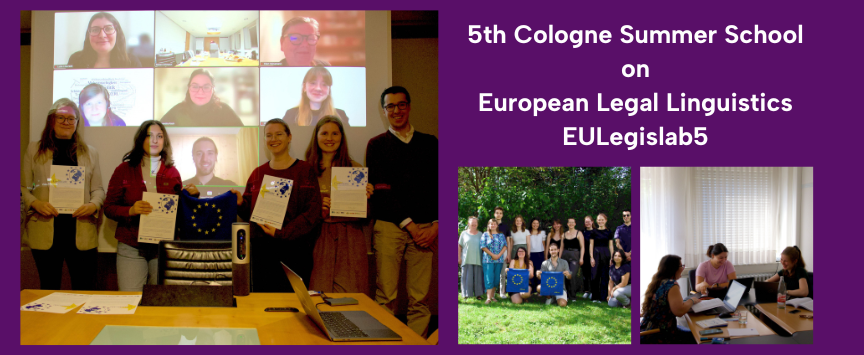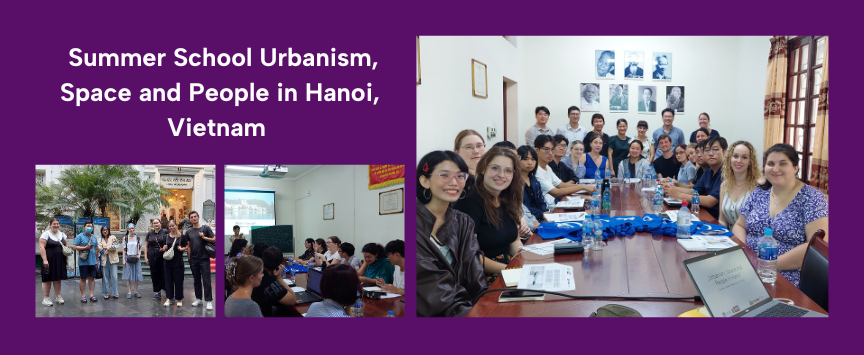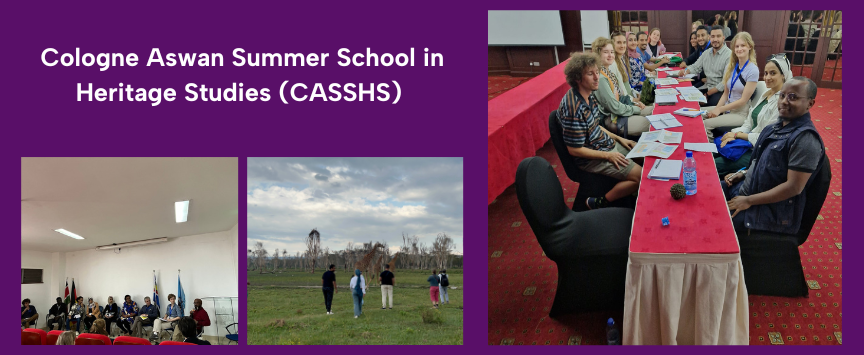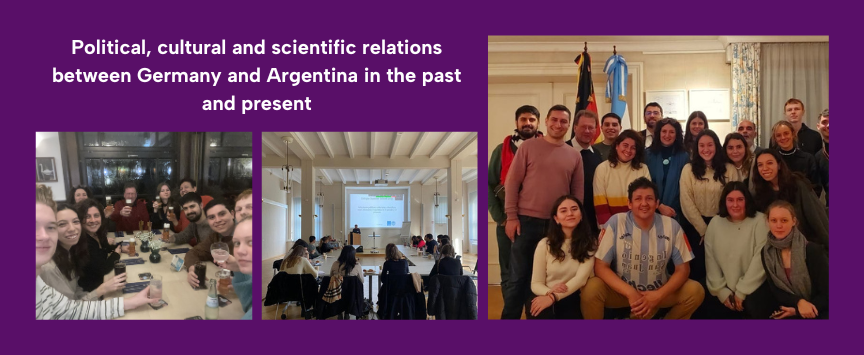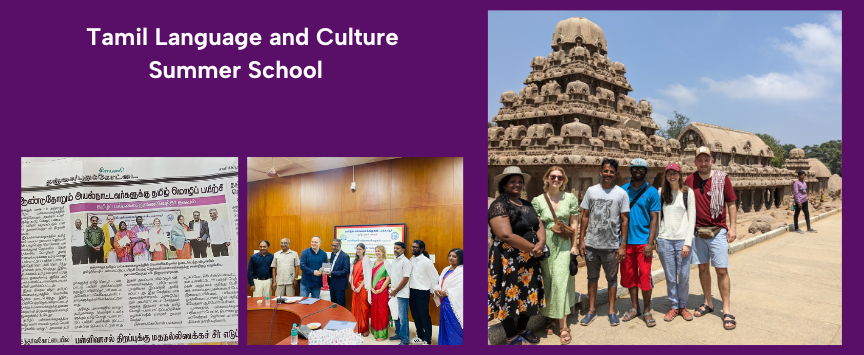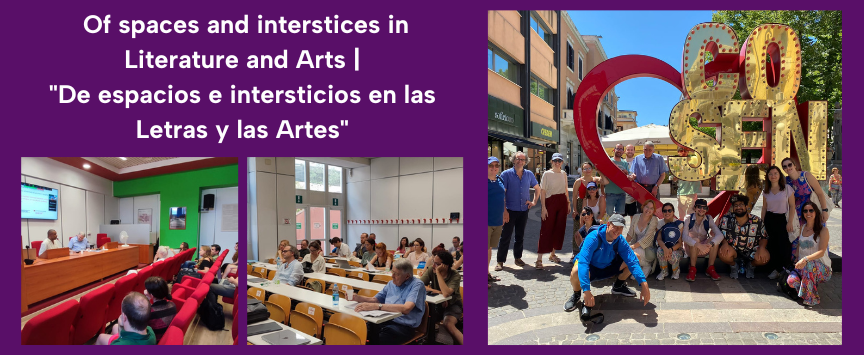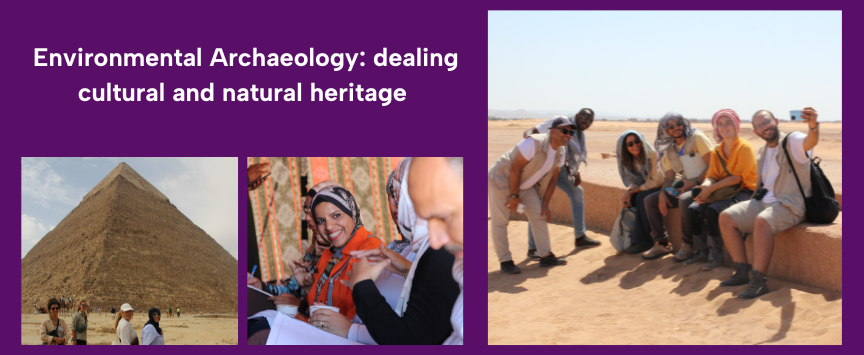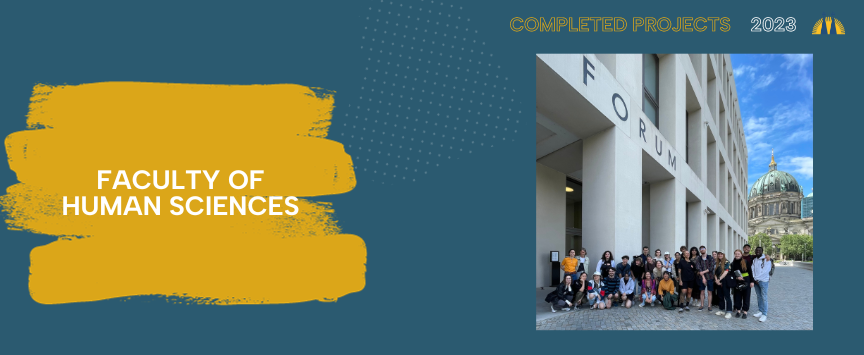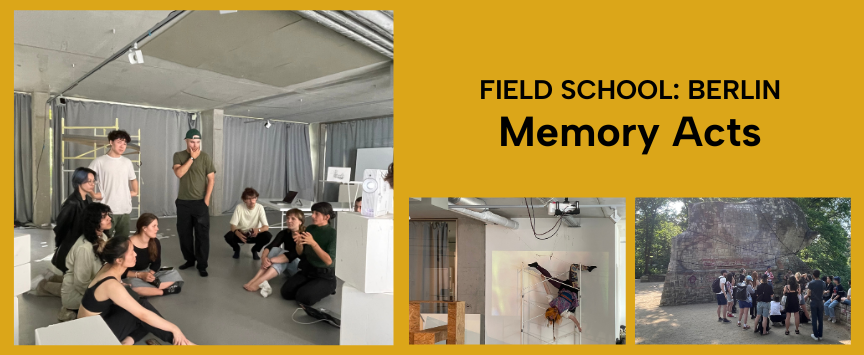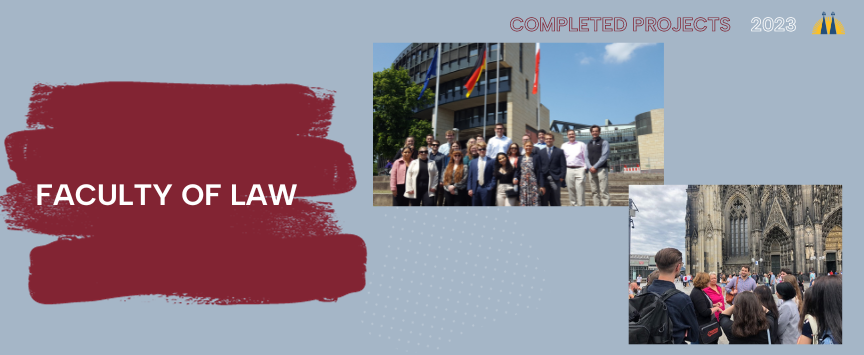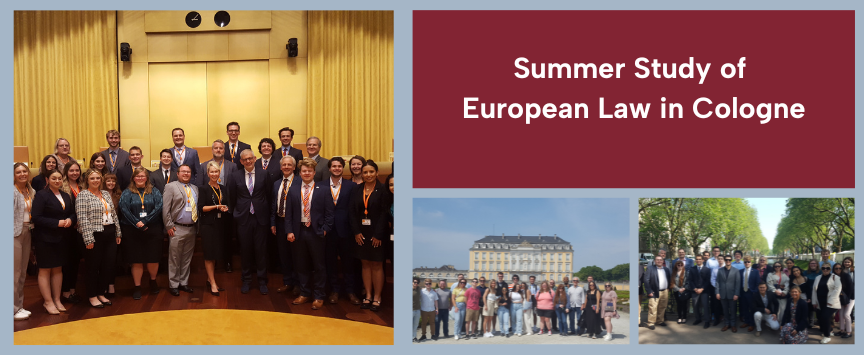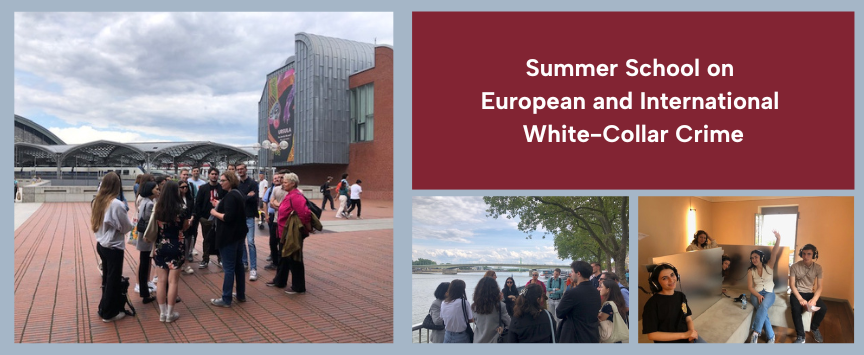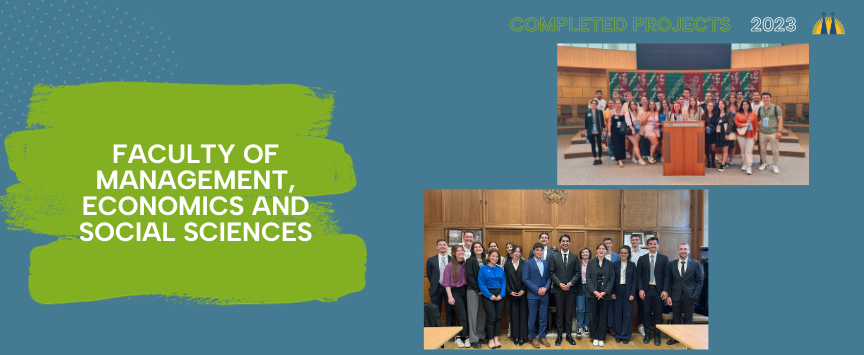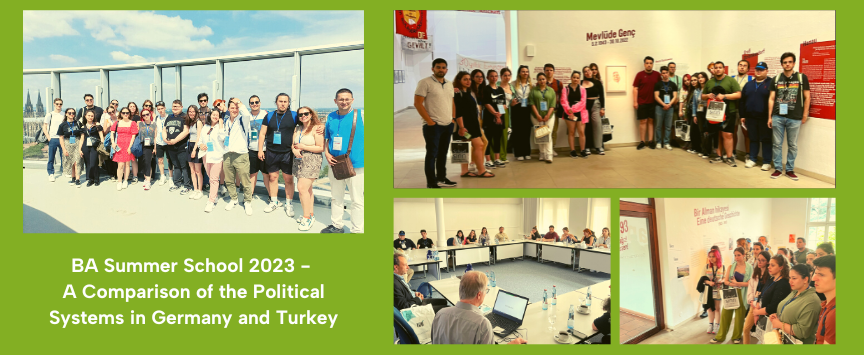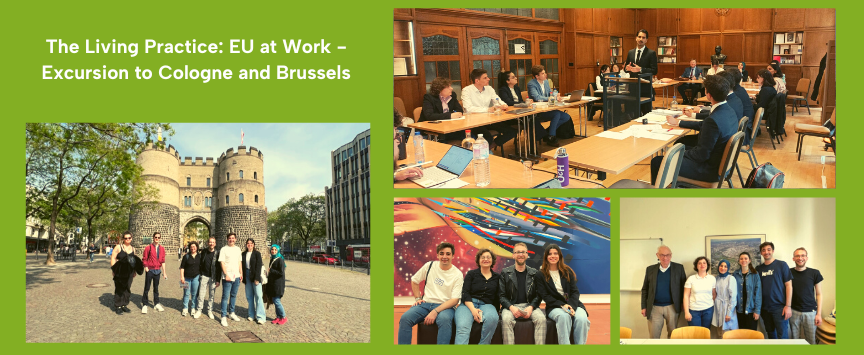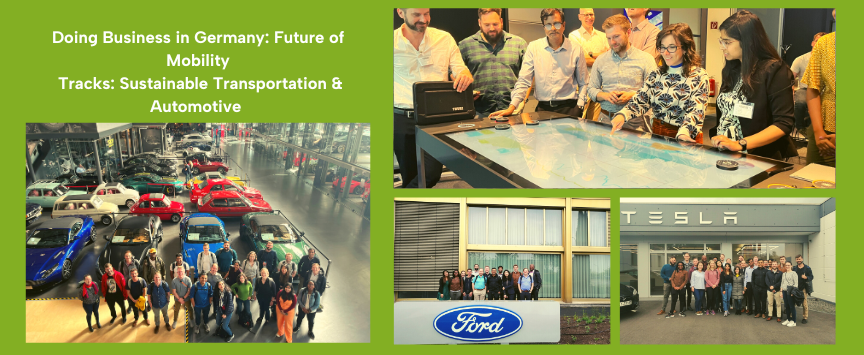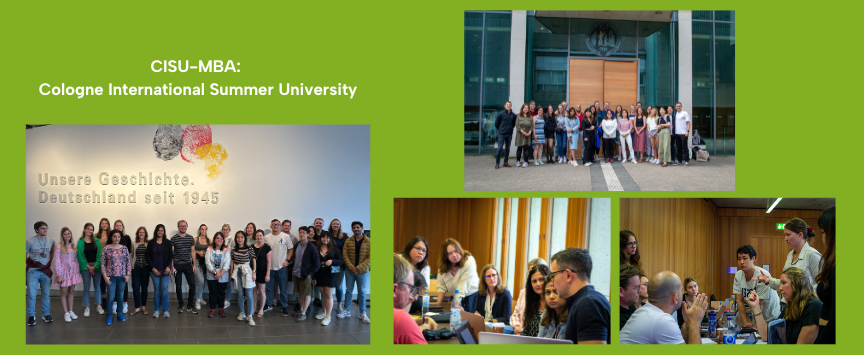Annual Web-Report: Cologne Spring & Summer Schools 2023
22 completed Spring & Summer School Projects in 2023
Cologne Summer Schools proudly presents the annual report about 22 completed Spring and Summer School projects. The high number of 22 short-term exchange programs can compete with the number of projects before the pandemic. In 2023, international short-term programs conducted in presence or hybrid formats at the University of Cologne or abroad at partner universities were highly demanded and Cologne Summer Schools provided partial funding for each project. The CSS-Team is very thankful to all project partners for their effort and hard work to organize Spring and Summer Schools and appreciates their commitment in offering short-term mobility programs to UoC and international students.
The total number of granted mobility scholarships in 2023 is 393. BA, MA and PhD students of University of Cologne and its partner universities worldwide were provided with the opportunity to explore new topics, network and extend their academic and intercultural knowledge. The CSS-Team is more than happy about the achievements and is looking forward to the new summer school season!
Summer School Projects realized by Staff of the Division International Affairs
Köln Alumni WELTWEIT Summer School 2023: Back to the Future
July 23 - July 29
Abstract
The Köln Alumni WELTWEIT Summer School 2023 took place from July 24 to July 28 at the University of Cologne. 14 participants from Brazil, Germany, Italy, Jordan, Canada, Croatia, Mexico, Singapore, Taiwan and the United States had the opportunity to deal more intensively with the topic "Back to the Future". Space was given to the concept of the future in a variety of ways. In the academic context, lecturers and employees of the University of Cologne were invited, as were people from the private sector and representatives from scientific institutions. Lectures, discussions, interactive seminars and own presentations brought the participants closer to the different nuances of this year's program in a variety of ways.
Highlights
Kathrin Andree and Ingo Kleiber from the Prorectorate for Studies and Teaching kicked off the program with a vivid presentation on the "Future of (university) education". This was followed by Prof. Dr. Annabelle Hofer's seminar on "Work of the Future", linking previously heard content with the actual view of the development of changes in the world of work. Melissa Günther presented her specially founded platform "Found Factory", a tool which connects interested people from science to support their projects with potential funders and supporters. Dr. Zilla from the Stiftung Wissenschaft und Politik, Berlin reported on the field of feminist foreign policy and invited a critical discussion.
Insights into current research contexts of the CECAD Cluster of Excellence were presented by Prof. Dr. Carien Niessen, who addressed "New findings in aging research, new opportunities for age-associated medicine?". The week was rounded off by Ingo Kleiber and Kathrin Andree on the topic of "Artificial Intelligence".
A practical and real-life interaction with the future took place through excursions to regional transportation companies. KVB Hauptwerkstatt provided an insight into their main workshop and rounded off the visit with a presentation on the company's future prospects. Cologne/Bonn Airport presented their study on the topic of "air cabs" and showed considerations and strategic planning for such an implementation.
Not only speakers and people from the field had the opportunity to enrich the Summer School with their contributions, but also the participants themselves. A mixed presentation of future perspectives of the participants took place, related to themselves personally and to their countries of origin. Thus, the climatic development of Mexico was dealt with, the threat to the habitat of orangutans in Malaysia, the working form of digital nomadism was presented, as well as the view of current events of the indigenous native population of North America.
In addition to the scientific and practical inputs, the actual exchange among the participants was of highest priority. An informal get-together on Sunday, July 23, provided an opportunity for a relaxed get-to-know-you and exchange of ideas. The official opening took place at a Welcome Dinner in the brewery "Unkelbach", which attracted with German specialties and a typically German bowling alley. Due to the rain, the week came to a successful end at the Bona me at the Deutzer Freiheit, which was the perfect conclusion to an interactive and enriching week.
Testimonials
"The best gifts of the Summer School: valuable teaching, cultural exchange and a glimpse into the future. The future is colorful, international and diverse". (Sandra from Mexico)
"I really enjoyed some of the talks and subjects and the activities that we did - like Kegeln spielen (German bowling). I like that the lectures are in German and that this is the only place per year I get to come back and practice my fourth language! Very grateful for that". (Anonymous testimonial)
Summer School on Chinese Language at the Tongji University
August 7 - August 25
Abstract
The Summer School in Shanghai at Tongji University enables students to gain insights into Chinese culture and society and at the same time acquire basic Chinese language skills. This year, 2 courses with differentiated language levels were offered. An advanced course with 10 participants and a beginner/intermediate course with 8 participants. This enabled students to improve their language skills in an even more targeted way. In addition to lectures, the program also included regional cultural events such as shadow boxing, Chinese calligraphy and Chinese painting. Due to the close proximity to culture, these events have been highly appreciated by students in the past. In addition, excursions to Hangzhou and Wuzhen were offered and made possible.
A company visit to the German Center Shanghai was certainly also a highlight. The participants were able to gain a first-hand insight into working life and living in Shanghai through a personal presentation by the CEO, Christian Sommer. The organizers of Tongji University made excursions possible for the participants, including to the "World Expo Museum" in Shanghai, "Shanghai Tower" with a height of 632 meters, "Pudong Museum of Art" and a sightseeing boat trip in the evening on the Yangpu River, with a wonderful view of the illuminated facades and skyline along the river. The Summer School had many impressive highlights. The stay and the experiences will remain vivid memories for all participants.
Highlights | Students' perspectives
"The focus of the summer school is to offer participants the opportunity to get to know Chinese culture and to convey a feeling for the Chinese language. So we were offered a language course adapted to the respective level, as well as cultural courses such as a calligraphy course or Qigong lessons. In addition to the activities at the university, we also had very interesting excursions, such as to the second tallest building in the world, the Shanghai Tower, or to the city of poets and artists, which is known for its beautiful nature called "Hangzhou". We were also able to visit the German Center in Shanghai, which is an office building with over 500 resident companies. We were warmly welcomed there by CEO Christian Sommer, who gave us an interesting presentation on China's economic development and relations with Germany. During the summer school, we had the opportunity to discover as much as possible in a very short space of time and gain a diverse impression of Shanghai". (Jovana, student of the University of Cologne)
"The teachers and buddies at the International School were always there to help us outside of lessons and the program and gave us valuable tips. They were extremely committed and open-minded, which made us feel safe during our stay. Those responsible at the University of Cologne also contributed in a remarkable way and far beyond their organizational duties, were always interested in communicating as equals and always took part in joint activities and excursions. A weekend trip to Hangzhou and Wuzhen, which was an exhausting but eventful end to the first week of the trip, and an interesting visit to the German Centre in the second week were further highlights organized by the University of Cologne. Last but not least, the special community of participants should be mentioned. Such a travel experience quickly and intensively welds the participants together: Friendships were formed that will continue to exist even after we return home". (Simon, student of the University of Cologne)
Testimonials
"Participating in the Cologne Summer School has deepened my love for Chinese culture and broadened my understanding of the very diverse China. It was an unforgettable trip, that I can recommend to anyone who has the opportunity to participate. It was an adventure that I will always remember." (Jovana, student of the University of Cologne)
"Even before I left for China, I was aware that I was in for a culture shock. But the reality far exceeded my expectations. The Summer School 2023 not only broadened my academic horizons, but above all my personal ones. Looking back, I am very grateful to have gotten to know Chinese culture and the city of Shanghai in this way. For me, it was the best opportunity to visit China for the first time." (Simon, student of the University of Cologne)
Social Inequality Beyond Europe - Education and Social Stratification in India
September 17 - October 1
Abstract
The Summer School in India 2023 offered participants a unique and enriching opportunity to engage deeply with the vibrant mosaic of Indian culture, religion, and society. The program included Hindi language classes, henna workshops, and insightful lectures on topics such as "Current Issues in the Indian Education and Economic System." Participants also had the chance to visit traditional Indian villages and participate in one of Pune's most significant religious festivals, "Ganesh Chaturthi." The invaluable contributions of our Indian buddies enhanced the overall experience and created lasting memories for all participants.
Highlights
Ganesh Chaturthi (19.09.2023 – 20.09.2023)
On September 19, 2023, the most significant religious festival in Pune, "Ganesh Chaturthi," began. Participants had the unique opportunity to actively participate in the festival and wander through the winding streets of the old town. Everywhere, people were gathered to experience the energetic performance of drums and dances. The rhythmic thunder of the drums was so powerful that one could feel each beat in their own heart. The temples, in front of which people patiently stood in line to admire the five main statues of Ganesha, looked incredibly impressive and magical. The perfect blend of music, culture, dance, and religion, along with the crowds venerating the same god, transformed every moment and experience into something one usually only sees in movies.
On September 20, 2023, the participants even received a guided tour of the entire old city center to learn more about the history of the temples. This comprehensive approach created a complete picture and provided an experience that hopefully remains unforgettable.
Visiting the culinary School of Symbiosis (21.09.2023)
Another outstanding experience of the Summer School in India was the cooking workshop. Symbiosis University has one of the largest culinary faculties in Asia. The participants were warmly welcomed into the kitchen by the head chef and his students. After being provided with the necessary cooking attire, the head chef briefed them on the dishes to be prepared and the recipes to be followed for the day. The students and participants were divided into teams and actively participated in the cooking process, offering assistance and support. Working in a professional kitchen provided the participants with a direct sense of the diversity and flavors of Indian cuisine. In the end, all participants and students gathered together to enjoy the prepared dishes. The head chef highly praised the results and commended the participants for their culinary skills. It was a shared meal that touched not only the stomachs but also the hearts of the participants, leaving them with an unforgettable memory of Indian cuisine.
Bollywood Dance Workshop
To develop a better understanding of Indian culture, all participants took part in a three-hour Bollywood dance workshop. What began as a casual activity evolved into a professional dance performance, similar to those staged during the Ganesha Festival. During the festival, participants not only listened to the music, admired the beautiful temples, and watched but actively engaged in the dance, becoming a part of the festival and its culture. This created a comprehensive experience that appealed to all senses of the participants, providing them with a unique insight into Bollywood culture.
Mehndi Workshop
Another significant highlight, perfectly timed in the schedule, was the mehndi workshop. Participants had the opportunity to learn the techniques of mehndi tattooing, starting from basic skills to more intricate patterns on paper. Similar to henna mehndi is not permanent. Once each participant became familiar with the fundamentals, they had the chance to choose a design that would be drawn by the experienced mehndi artist. Everyone could select a tattoo that resonated with their personality and vision. The most creative participants even crafted their own symbols and mandalas. By the end of the workshop, each participant had their desired tattoo and they proudly wore it for the remainder of the event. These personally designed tattoos became a proud expression of individual creativity, enhancing the experience of the Summer School in India in a truly special way.
Indian village visit
A particularly enriching experience for the participants was the trip to the Indian village. After a two-hour bus ride, the participants arrived at the renowned village, where they were welcomed with homemade tea and a delicious breakfast. Following this, there was a guided tour of the houses and gardens, during which the essential medicinal properties of the surrounding trees and plants were explained. Then, a tractor tour of the village commenced, culminating in a field where participants could pick their own vegetables, which they later prepared themselves upon their return.
The closeness to nature and the act of cooking vegetables they had harvested personally were unforgettable experiences that brought the students closer to Indian culture. The inner peace and direct connection to nature they experienced in the village are hard to put into words. The trip to the Indian village was not only a cultural exploration of India but also a journey toward inner peace and personal growth.
Testimonials
"The Cologne Summer School in India at Symbiosis University in Pune was an incredibly enriching experience for me. The two weeks I spent there broadened my understanding of Indian culture and was a lot of fun at the same time. The program offered not only academic depth, but also a rich cultural experience. From the captivating lectures to the fascinating excursions to the vibrant city of Pune and the surrounding areas, I learned and experienced so many new things. The supervision and support from the University of Cologne and Symbiosis University was outstanding, and the opportunity to interact with students from different countries broadened my horizons. The Cologne Summer School in India is an unforgettable experience that I would recommend to anyone looking for a unique opportunity to broaden their knowledge and immerse themselves in the fascinating world of India." (Hendrik, student of the University of Cologne)
"The summer school in India was an incredibly exciting and enriching experience! We had a great, varied program where we not only learned about the economic and cultural situation of the country, but were also able to experience it for ourselves. Through various day trips, we were able to gain a lot of insights and get to know different facets of the country. Above all, we were able to constantly exchange ideas with the local students, which made the whole stay a great group experience!" (Bianca, student of the University of Cologne)
Spring Schools realized by the Faculty of Mathematics and Natural Sciences
Trilingual Programme Cologne-Tokyo (TLP)
March 4 - March 18
Abstract
The Trilingual Programme (TLP) is a special course at the University of Tokyo to provide students with extensive language classes for the “third” language other than English and Japanese. The course is highly competitive since only the students who scored within the top 10% at the university entrance examination are allowed to enroll. Entrance examination for University of Tokyo is the most competitive among all Japanese universities. Thus, the students who are allowed to enroll the TLP are arguably the best and brightest among the cohort of Japanese young people.
Highlights
The program consisted of three parts. (A) Language course in the morning, (B) Visits to laboratories and cultural institutions such as museums and concerts, and (C) Exchange tandem meetings with local students.
(A) Language course in the morning
Until 2019, the Deutsch als Fremdsprache (DaF) organized 4-week pre-semester language course in March and September for the students who will join our university from Summer and Winter semesters. Students from Tokyo joined this course. Since 2020 DAF language course moved online, and DAF decided that the pre-semester course will be held online even after the end of COVID. Students who relocate from foreign countries to Cologne often have problems in getting visa and finding housing smoothly. Thus, they cannot move to Cologne before the start of the 4-week pre-semester language course. Online course via Zoom is advantageous, because the students can start taking the course while they are still in their home countries, and can smoothly continue the course during and after relocation.
(B) Visits to laboratories and cultural institutions
In the afternoon, after the language classes, they visited various institutions. Based on the requests by the participating students, we organized visits to three laboratories/research facilities of University of Cologne. One is the 3D Virtual-Reality Facility called “CAVE”, ran by our IT center (RRZK). There, they dived into the brain of the fruit fly, virtually expanded to the size of 10 meter (original size is 0.6 millimeter), to examine neurons from within the brain. They also enjoyed virtual tours into archeological sites such as the Ancient Roman tomb, which was converted to a 3D model. The second is Prof. Ito's lab in the Institute of Zoology, where students visited a large facility to maintain thousands of animal strains and a whole bunch of advanced microscope systems. The third is Prof. Dr. Nicole Kramer at the History Institute, where students learned the history of the city of Cologne, our university, and the problems in the post-war history of Germany, the last of which is the primary research focus of Prof. Dr. Kramer.
As for museums they had a guided tour at the Haus der Geschichte in Bonn, Schloss Augustusburg in Brühl, and NS Dokumentationszentrum in Cologne. Students also visited various other museums in Cologne during their free time. In addition, students visited the Japan Cultural Institute in Cologne, the broadcaster "Deutsche Welle" in Bonn, and German Academic Exchange Service (DAAD) in Bonn. There, they had explanation and free discussion time with the representatives of these institutes. The students also visited Cologne Philharmonic Hall for a classic concert by the WDR radio symphony orchestra. Some of the students who are especially interested in music also visited other concerts by themselves, purchasing the last-time tickets sold one hour before the concerts. During weekend, they also enjoyed excursions to Aachen and Drachenfels.
(C) Exchange tandem meetings with local students
We organized tandem meetings in two occasions. The first was a meeting with the students in the University of Düsseldorf. The second was a meeting with the students in the University of Cologne.
Spring & Summer School Projects realized by the Faculty of Arts and Humanities
Tamil Language and Culture: Spring School in South India
March 6 - March 26
Abstract
The Tamil Language and Culture Summer School enables participants to learn and practise the Tamil language in a structured way while immersing themselves in Tamil society and culture. Academic and cultural exchange is facilitated through cooperation with local scholars, students and other partners. The Summer School in March took place mainly at four locations: At the Central Institute for Classical Tamil (Chennai) we followed lectures on classical Tamil literature, in Mamallapuram we visited archaeological sites, at the Tamil University Thanjavur there was a wide range of courses on Tamil culture (including dance, drumming and stick fighting), while in Korkkadu (Pondicherry) we were able to participate in village life. The Tamil language course and excursions rounded off the spring school program.
Highlights
A special event during this Summer School was the spontaneous meeting with Dr S. Mohanavelu, author of the 1993 book "German Tamilology - German contributions to Tamil language literature and culture during the period 1706-1945". Mr Mohanavelu (born in 1945, lives in Chennai) gave an exciting lecture on German missionaries in South India. Rich in detail and with many anecdotes, he provided us a balanced picture of the long German-Tamil cultural transfer, which - apart from missionary and power interests - also included aspects of cultural appreciation and mutual learning. A joint dinner with Mr Mohanavelu rounded off the very interesting and spontaneous lecture.
The next highlight was the visit to Dr K. Veeramani, the leader of the Dravidian Movement/Dravidar Kalagam (DK), one of the most important social reform movements in India. We met him at the "Periyar Thidal" headquarters in Chennai on March 24. Veeramani - born in 1933 - is still an astute and humorous speaker and told the students about the movement that has been working for self-respect and rationalism and against social segregation and superstition since 1925. He took his time and answered the questions of all participants in detail. Finally, we were able to purchase books and DVDs about the movement for social justice in the in-house bookshop for further study and use in the course.
Testimonials
"Overall, I can say that my choice to take part in the Tamil Spring School was an extremely positive experience that inspired me personally and academically and shaped me holistically. I also met a lot of cool people from other disciplines in a great group dynamic. I deepened my understanding of India as a whole and the Tamil identity constructs such as language, religions, history and culture in encounters with the diversity of the country, people and teaching. Throughout the entire programme, Sven Wortmann always supported us students very well on site and in Germany with questions of all kinds and also managed situational cultural challenges diplomatically and competently." (Chiara Fröhlich, Student of Sinology/ Catholic Theology/ Educational Sciences, University of Tübingen)
"Throughout the three weeks, we had the opportunity to visit many fascinating sights, including Hindu temples, museums, churches and a crocodile and snake farm. The language course proved to be extremely valuable, as we quickly made progress in Tamil and were able to hold our first conversations with locals... As a student of the Master's programme in Gender and Queer Studies, I was particularly interested in topics such as gender justice, women's rights and queer rights in Tamil Nadu. I was thrilled that the flexible lesson planning allowed us to explore and discuss these topics in depth." (Clara Jöster-Morisse, Gender and Queer Studies student, University of Cologne)
5th Cologne Summer School on European Legal Linguistics - LegisEULab 5
June 10 - November 30, hybrid
Abstract
In September 2023, the European Legal Linguistics team of the University of Cologne was proud to welcome eight students from Cologne and three students from other EU member states to the 5th Cologne Summer School for European Legal Linguistics. Due to dual degrees, students from Czechia, France, Germany, Italy, Poland, and Spain were present at Cologne University. For the 4th time, the CSS-ERL simulated the EU legislative procedure in the “LegislEUlab”. After a productive and fruitful online preparatory phase from June to August 2023, the attendance phase of this year’s CSS-ERL was held on the University premises from September 6 to 13, 2023. We would like to express our deepest gratitude to the “Kölner Gymnasial- und Stiftungsfonds” and the Cologne Summer Schools project of the University of Cologne who made the implementation of the programme possible by providing financial support. In continuation of its established and successful concept, the CSS-ERL dealt with an ongoing EU legislative procedure. Due to its over-arching importance and wide societal impact, this year’s topic was the Commission’s proposal for a Regulation of The European Parliament and of the Council laying down harmonised rules on Artificial Intelligence, (“Artificial Intelligence Act”; 2021/0106(COD)).
Highlights
A highlight of this year’s summer school in that regard was the visit of Axel Voss, Member of the European Parliament (MEP). This was the first time that an MEP participated in the CSS-ERL in person! After a concise presentation on his work on the Artificial Intelligence Act as (shadow) rapporteur, Mr Voss engaged in fruitful discussions with the students. They were both honoured and fascinated by his visit, but did not refrain from asking critical questions and providing potential counterarguments which they then analysed with Mr Voss. The debate continued with all participant’s enjoying coffee and cake in Cologne’s beautiful late summer. The project work on the premises of the University of Cologne was crowned by a varied cultural and social programme in Cologne, enabling people to get to know each other and forge new friendships. Even though the weather did not always cooperate, it was possible to offer an extensive guided tour of Cologne as well as having dinners together, for instance at traditional “Haus Schwan”. After submitting personal essays, the students received a certificate for their successful participation in a hybrid award ceremony in November.
Testimonials
Participating in the CSS on Legal Linguistics has been a great experience both on an academic and human level. I really enjoyed working with my group, and it was particularly interesting to have different backgrounds and languages for the linguistic comparison. Despite the dense and technical nature of the topic we worked on, I feel like I learned a lot on various levels. With my group, we managed to establish a work methodology with guidelines and weekly meetings that have enabled us to have several enriching exchanges. In fact, we had passionate debates during the linguistic comparison, and our different approaches have allowed us to have a broader perspective.
The part I enjoyed the most was the linguistic tasks, given my background, and it provided me with valuable new perspectives. I learned about the importance of avoiding ambiguity, as it can lead to legal consequences. This is particularly crucial in the context of EU texts, but it has also made me more mindful in my translation work. Finally, I gained a wealth of knowledge about Artificial Intelligence. This topic was entirely new to me, just as working with a focus on the drafting process was a novel experience. Despite the fact that AI has existed for years, the recent breakthroughs we are witnessing make regulation imperative. It has been interesting to have a preparatory phase with several recommended readings to achieve at least a partial understanding of the subject and the logic of the legislative text. (Lucie Lhaurado, Universidad de Salamanca)
By participating in the Summer School, I gained a deeper understanding of AI, in particular its current legal hurdles in regulating. One being for example the friction between regulating its use to the highest extend possible to ensure its safety for consumers whilst also leaving room for further development in the future. Even though Artificial Intelligence may not have been an initial interest of mine, the Summer School succeeded in me now feeling more knowledgeable about the topic and having the sense that I will be able to comprehend the processes better once the regulation comes into effect. In conclusion, when it comes to the subject of AI, my experience in the 5th Cologne Summer School of European Legal Linguistics offered a chance to familiarize myself with a subject I had previously disregarded. It underlined the importance of being open to new topics, even those initially outside my comfort zone. (Alexandra Koch, Universität Bielefeld)
I definitely gained a new perspective on the importance of linguistics and translation when producing a legal text in the EU. Ms Mantlik described that it was of particular importance that an English term was easily translatable into the other official languages. It would than rather be suggested for drafting. Since we worked closely on the vocabulary, we could see that although there is an incentive to use the same words, the legislator sometimes deviates from a regular term without an apparent reason. At this point, I also came across the phenomenon of autonomous interpretation in the EU again. For the interpretation of EU legislation, I am sure to have gained useful insights that will allow me to better understand an EU legal concept with the help of other language versions. (Judith Hennes, Universität zu Köln)
De espacios e intersticios en las Letras y las Artes / Of spaces and interstices in Literature and Arts
July 23 - July 30, hybrid
Abstract
The Cologne Summer School 2023, held at the Università della Calabria in Rende, was a significant event focusing on the interplay of spaces and interstices in Literature and Arts. The program, conducted in a hybrid format, included a wide range of topics, from fictional worlds and imaginary natural spaces in poetry to the theory of narrative spaces within cognitive poetics. The event also featured discussions on queer dream spaces in literature, the intersection of language and space in Spanish authors' work, and the role of food and drink in folklore.
Highlights
A notable contribution came from an Argentine colleague from La Plata, who, due to a coincidental invitation to the University of Santiago de Compostela, offered to extend her stay to participate in the Summer School. This opportunity provided students with valuable insights into Latin American perspectives, enhancing the overall learning experience. The hybrid format of CSS 2023, blending online and in-person elements, while initially a response to logistical challenges, emerged as a significant enhancement to the event's accessibility and reach. This format enabled a broader audience to participate, including those unable to travel due to the ongoing global challenges. The inclusion of online discussions with participants from Argentinian universities further enriched the event's international dimension.
Testimonials
"As a participant of the Cologne Summer School 2023, I was genuinely impressed by the depth and breadth of discussions on the interplay of spaces in literature and arts. The hybrid format was a game-changer, allowing for a unique blend of in-person and virtual interactions. The highlight for me was the unexpected participation of the Argentine professor, which added a valuable dimension to our understanding of Latin American perspectives." (Anonymous)
"The quality of lectures and the diversity of topics discussed were remarkable. The event not only broadened my academic horizons but also provided a platform for meaningful cultural exchanges. The adaptability of the organizers in the face of logistical challenges was commendable." (Anonymous)
"The Cologne Summer School this year was an enlightening experience for me. As a student interested in the arts, the discussions on narrative spaces and queer dream spaces in literature were particularly engaging. What stood out was the level of engagement and interaction, even in the online sessions. It was a bit disappointing to have some faculty members cancel due to travel issues, but the organizers managed to fill those gaps effectively. Overall, a well-organized event that managed to overcome its challenges admirably." (Anonymous)
Indian History and Culture
July 31 - August 20
Abstract
The Summer School Indian History and Culture enables participants to learn and practise the Tamil language in a structured way while at the same time immersing themselves in Tamil society and culture. Academic and cultural exchange is facilitated through cooperation with local academics, students and other partners. The Summer School in July/August took place mainly at two locations: The course centre was the premises of Karuppan Agencies in Korkkadu (Pondicherry), where we were also able to participate in family and village life. At the beginning and end of the course period, we visited Mamallapuram archaeological sites. A two-day excursion took us to Thanjavur. The regional studies course units, the Tamil language course and spontaneous excursions took place throughout the entire stay.
Highlights
Highlights of this summer school were the teaching units by Dr S. Arokianathan, who is an internationally renowned luminary in the teaching of the Tamil colloquial language. His dynamic audio-lingual teaching method, his precise knowledge of the needs of non-Indian learners and his approachable manner make his lessons very efficient and popular. A visit to S. Arokianathan and a dinner together rounded off the very interesting course units.
The next highlight was a visit to R. Maheswari, one of the few female priests of Hindu village religion. She has been running the temple of the goddess Ponniyamman in the village of Keezhur (Tamil Nadu) for 55 years. Her small temple is covered by a breathtakingly large banyan tree with aerial roots. Priesthood is a tradition in her family. However, she is the first female priest in the family. We had the opportunity to have an interesting conversation with R. Maheswari about female role models, representativeness and gender norms in the priesthood. R. Maheswari was also very pleased to agree to her and her temple being mentioned and illustrated in a scientific paper at the University of Cologne.
Testimonials
"The combination of academic input from Sven Wortmann and Desigan's local perspective made the summer school very special. By additionally learning the local language "Tamil", we not only learned a lot about the country, but were also able to make contact with the Tamils through our first sentences... In addition to the various academic inputs, we were also able to get to know India in a "practical way", firstly through a course in Cilampam (a typical stick fighting sport in India) and our own yoga lessons, which the yoga teacher from the village gave us. All in all, I can only say that the Summer School is THE way to get to know India at in an authentic way. I would never have experienced so much on a trip to India on my own and I am incredibly grateful to have taken part in the Summer School." (Henrike Deitert, University of Cologne)
"It was definitely worthwhile for me to attend the summer school. I learned a lot of things and had a great time. The relationship with my "classmates", Sven Wortmann and our Indian host family was always friendly and really nice. I would definitely recommend the summer school to others. Apropos, you don't need to have any prior knowledge of India to take part in the school." (Julian Hartmann, University of Munich)
Cold Case Cut - Excavations and Research in a residential part of the Roman City of Xanten
July 31 - August 25
Abstract
From July 31 to August 25 the CSS-funded educational excavation project started in cooperation between the LVR-Archaeological Park Xanten, the Radboud University Nijmegen, the University of Applied Sciences Cologne (TH Köln) and the University of Cologne. The aim was to investigate a Roman residential quarter in the north of Colonia Ulpia Traiana. Already in the first year, important findings were obtained during these excavations: Foundation walls of Roman buildings of the Colonia period were unearthed and numerous remains of the predecessor settlement of Colonia Ulpia Traiana were documented. The participating students from Cologne and Nijmegen were given a comprehensive introduction to excavation work, and in the accompanying cultural programme they became acquainted with Roman sites in the immediate and wider surroundings of Xanten.
Highlights
Geophysical investigations in the northern residential quarter (Insula 29) of Colonia Ulpia Traiana showed in the run-up to the project that dense building development was to be expected in this area of the town. The excavation carried out this summer was therefore particularly intended to explore the structure of this insula’s internal development. In this context, three areas were opened up, that brought to light different features. Among other things, there were remains of walls made of bricks as well as solid greywacke stones. In addition, various pit situations from the early period of Colonia Ulpia Traiana were superficially revealed by the excavation team, which will be further archaeologically investigated in the campaigns of the coming years.
In addition to the scientific questions, the training of the students from Cologne and Nijmegen was also in the foreground. They gained insights into the surveying work, excavation techniques, documentation and stratigraphy of such a project. In the field of finds processing, they also received an introduction to the cleaning, inventorying and chronotypological classification of artefacts made of clay, glass, bone or metal. In parallel, the excavation was accompanied by students from the University of Applied Sciences Cologne (TH Köln), who introduced a digital documentation system for excavations as part of the project and tested it extensively for its practical suitability.
During the weekends, the students went on excursions to the Roman sites in Haltern and Nijmegen-Noviomagus to gain further historical and archaeological insights.
Testimonials
"At the end of the third week, every trench (except for 0002) was ready for the final documentation that would happen before the trenches would be covered. We also got an introduction to roman pottery in Xanten and finding preservation, by a member of the APX-Team, which was very interesting. It helped me to better understand the spectrum of findings we get from the excavation". (Matthias Rosenthal, University of Cologne)
"It inspired me so much more accepting the artists advice, by for instance making the edges of rocks darker to create depth in the piece, and using a light hand to color large surfaces. I was very happy hearing from many people who saw the drawing that I did well, and while i do see room for improvement, I am happy with the result and looking forward to giving it, once again, my best shot in the near future". (Savannah Peters, Radboud University Nijmegen)
Read more about the project in Xanten here
Summer School Language as / and Heritage
August 26 - September 2
Abstract
The Cologne Aswan Summer School in Heritage Studies 2023 on Language as / and Heritage was dedicated to a highly relevant topic in current heritage discourses. For too long a time languages have been considered as medium only for the transmission of heritage, not as a heritage asset on its own. The Summer School introduced the participants from Arab Academy in Aswan and University Cologne to current discussions and critical approaches in the field. We approached the considerably wide subject from different directions in an introduction online: we started with perspectives from Nairobi, based on a documentary with Yvonne Adhiambo Owuor on Kenyan-Chinese entanglements in past and present, to highlight the multidirectionality of memory, continued with a discussion on food, language and heritage, concentrating on Nubian cuisine and Western Nilotic taste words. Then we added a concise overview of relevant Nilo-Saharan languages and their history, followed by a debate on the diverse roles of languages in museums, taking as a case study the Nubia Museum in Aswan, concluding with sounds, music and songs and their importance for the conservation, recreation and the invention of tradition. A one week stay in Nairobi concentrated on the conference panel Heritage and the Art of Language at the 16th Nilo-Saharan Linguistics Colloquium. A diverse group of panelists - artists, scholars, activists - mostly related to Nubian and Lwoo communities - gave first-hand accounts on their lived involvement with languages as/and heritage. The panel culminated in a podium discussion with panelists which was conceptualized, realized and moderated by the participating students.
Highlitghts
Heritage studies become especially fascinating and important when meeting lived realities. Therefore, it was a special moment for us to have the chance to listen to and discuss with a group of people deeply involved in the life of communities in focus for the topic of our panel at the Nilo-Saharan Linguistics Colloquium. Several of the panelists are members of Nubian communities displaced in the first half of the twentieth century and in the 1960ies due to the building of dams south of Aswan. As one of the participants said: "In the times of displacement, language becomes a place of refuge; a place of hiding Nubian places, livelihoods, stories, and knowledge. It's where Nubian epistemology is found as it sustains meaning.” A young professional informed us about his own engagement with one of the Nubian languages since he learned it as a boy, and a language activist explained to us her programmes to encourage young people to learn a Nubian language or improve its knowledge, as a vital part of their care for heritage and identity. An architect illustrated the importance of places of conversation at houses and how they were reconstructed, added by Nubian people to the normed space of houses in the resettlement areas. Another participant presented the steps of the Luwo Translation Project begun in 1977 to translate the Bible into Lwoo, reaffirming his belief that this effort will contribute to keep indigenous languages – usually only spoken but not written - “alive linguistically and culturally”.
All these are wonderful examples of how the struggle to maintain these languages is community driven and fuelled. The language of music and songs is an essential aspect of the topic too. Hamza el Din’s Escalay not only recalls the sound of the waterwheel from a time past, but with the song in a Nubian language merging the sound of the wooden gears it transforms the listener into another world. It had an impact on Kronos Quartet as well as on Lebanese-French singer and composer Bachar Mar-Khalifé. This was demonstrated in the online sessions, along with the invention of a heritage tradition induced by Whittaker’s schmaltzy ballad on Shimoni. The references to some of the heritage traditions from Kenya proved to be stimulating for the students. Participation in a Safari in the region of Nairobi revealed new aspects of a highly commodified heritage sector, and a visit to Nairobi National Museum with its exhibition on Joy Adamson added more to the ambiguity language as creator of heritage realities can have.
Testimonials
" I learned the importance of bigger cooperations and smaller teams of people in preserving language as a part of the heritage of a people. I gained perspective of how the people’s heritage is linked to their way of life (music, food, history and especially language) and how the panelists tried to incorporate this into the different work they did (e. g. as a linguist, architect, and others). It was a great chance to get to know the panelists better and understand how they held onto their heritage by different means and understand how they try to preserve this part of their identity." (Salome Thyen, University of Cologne, BA Archaeology)
"My trip to Kenya for the Nilo-Saharan Linguistics Conference at the University of Nairobi was a unique blend of professional and cultural immersion. Connecting with academics and professionals in my field, as well as experts in linguistics and African studies, was truly enriching. I was positively intrigued by the innovative research methods employed in the African context, and the daily exchange of profound knowledge left a lasting impact. This conference not only expanded my academic horizons but also allowed me to experience the rich cultural tapestry of Kenya and its academic community." (Ahmed Amr, Arab Academy for Science, Technology and Maritime Transport Aswan, BA Archaeology and Heritage Studies)
"As a participant from Aswan, my initial goals for the summer school programme were to learn more about the Nubian languages and to add to my knowledge of Aswan's culture. After attending the conference, I know more about the people speaking Nilo-Saharan languages and their cultures, which gave me the idea to start researching and studying them in greater detail. Going to Kenya was a unique experience for me since I got involved with a new culture and saw a different aspect of Africa. The most enjoyable part was meeting professors and college students who share your interests and could share knowledge to your advantage." (Yassmen Yehia, Arab Academy for Science, Technology and Maritime Transport Aswan, BA Archaeology and Heritage Studies)
Consortium of [six!]: Critical Media History / On Performance and Issues of Translation
September 3 - September 8
Abstract
[six!] is a consortium of six leading institutions that offer higher degrees in Theatre and Performance: Jawaharlal Nehru University (India), Northwestern University (USA), Pontificia Universidad Católica de Chile (Santiago), University of Cologne (Germany), University of Ghana (Accra), and Tel Aviv University (Israel). [six!] fosters collaboration and cooperation for advanced non-credit study, networking, and research. In 2022-23, [six!] conducted two seminar themes – “(Un)translatability in Performance” and “Critical Media History and Performance” – which were held online. This was taken forward during our on-site summer school at the University of Cologne’s Theatre Collection (Theaterwissenschaftliche Sammlung (TWS), one of Europe’s largest theatre archives, in the Wahn Castle, September 3-8 2023. “(Un)translatability in Performance” invited participants to explore theatre translation and untranslatability issues when various embodied languages meet on stage, working on translated canonical texts from different cultural backgrounds as well as traditions; “Critical Media History and Performance” aimed to conceptualise through the readings, discussion, and exercises that bring into dialogue practices from diverse geographies and times, a polyphonic perspective to theatre/performance history. Although the two differing seminars have been held separately, thus leading to a division of the summer school participants into two groups, the scheduled ‘Idea Marketplace’, ‘Poster Sessions’, ‘Group Project Preparation’-Slots, as well as ‘Workshop on 3-minute Thesis’ and ‘3-minute Thesis Presentation’ were actively incorporated within the schedule to break this barrier. The summer school’s approach was on the one hand to enable the opportunity to choose a field of interest and engage with faculty members affiliated with one’s research, on the other hand, the possibility to exchange and interact with contents, ideas and academic professionals of the parallel group, aiming to widen the perspective and access towards the respective research topic.
Highlights
[six!] was altogether an eventful week, emphasizing the importance of international exchange and communication. We welcomed our guests at the Karl-Rahner-Academy, combining the first encounter with a self-organised city tour. This not only enabled our participants to get to know the city of Cologne, its history and cultural heritage but effectively provided the very first opportunity for the participants to process the city stories in dialogue with one another while referencing their research interests. A similar observation was made during the ‘Kegeln’ event (German bowling). Regardless of the more fun, easy-going and late-evening setting, the student participants did not miss the chance to further get involved in academic discourses.
A highlight of our academic exchange program is already present within the concept and positioning of Consortium of [six!]: by deciding to cooperate with six universities worldwide, [six!] actively aims to implement a transnational and transcultural context, thus strives for a polyphonic discourse. Moreover, the TWS itself is to be named as an asset for academic exchanges of this kind. The archive material allowed to complement the theoretical framework and analyse the given topic qualitatively or comparatively, by enabling the participants an example-based approach. A memorable addition were the practical seminar units conducted by the faculty members of the University of Ghana and Pontificia Universidad Católica de Chile. In these, the participants had the opportunity to use the element of performance and acting to further examine the defined subject, disclosing that by not strictly dividing Theatre Studies from performing Theatre, scholars are capable of gaining crucial insights into their research – a practice not broadly institutionalised within the German Theatre Studies. Another notable component of [six!] 2023 was the joint visit of the Theatermuseum Düsseldorf (TMD), an archive/museum with a comparable history and presence as the TWS. By becoming acquainted with both institutions, the participants could experience how far an archive functioning mainly as a place of academic research (TWS) may differ from an archive functioning mainly as a place of exhibition. This was on one hand an insightful addition to grasp how understanding archives and collections can vary, on the other hand depicting a relevant professional field suitable for our participants. Certainly, the poster and the three-minute-thesis presentations are to be considered as a highlight of [six!]. Both formats provided the participants with the outmost substantial opportunity to voice themselves and discuss their presented research topic with the [six!] community. It was particularly rewarding to track the participants' progress by comparing their presentations at the beginning and the end of the academic program.
Testimonials
“I have no doubt that the knowledge, experience and skills gained at the summer school will make me a more successful researcher. During the three-minute lecture, I realized how much such a bilingual setting boosts one's visibility, knowledge, critical thinking and skills in mentoring. Furthermore, talking with other academics and touring the museums opened my eyes to new research topics I would like to explore, write about and put into practice (archiving of stage/ performance costumes). So that I can be a more valuable asset to the University where I work as a lecturer, even after I finish my studies. In light of that, I would like to express my profound gratitude to the institutions that organized and financially supported me and other participants. Thank you, and I hope for more of such opportunities.” (Sylvia Tetteyfio, Ph.D. student, University of Ghana)
“Having had the opportunity to be a part of the [six!] summer school at the University of Cologne was one of the most enriching experiences I have ever had. As a researcher, it is important for me to be able to have a subjective as well as an objective standpoint. The summer school provided me a space to learn from and interact with faculty and peers from diverse backgrounds, which opened my eyes and mind to many possible approaches to research. Most importantly, I learnt to view differently the mundane things that many of us tend to take for granted and, therefore, ignore. The archives at the Theaterwissenschaftliche Sammlung, the field trip to the Dusseldorf Theatre Museum and the exhibition opening at the Wallraf-Richartz-Museum were extremely inspiring. Overall, the summer school was exceptionally educational, yet so much fun!” (Minaxi Brahma, Ph.D. student, Jawaharlal Nehru University)
"This seminar was a wonderful experience. I had the opportunity to discuss quite specific concepts and ideas, which you don't always have the chance to find someone to engage with who shares the same interests. In some cases, I was pleasantly surprised to meet people who were already thinking similar things and willing to share their perspectives, research and learning processes. I had conversations that, honestly, I had been hoping to have for years with others in academia, as my interests tend to diverge from the mainstream research trends in my country. Likewise, I had some of the best feedback experiences in my intellectual life, gained methodological tools that I genuinely needed, and, at the same time, I felt a deep appreciation for certain ideas and proposals I've been working on. Of course, this also involves sharing very pleasant and profound experiences on a human level. I had the opportunity to make new friends, learn about their realities, and share a bit of my inner world. In my personal experience, this seminar was a safe space where people from different backgrounds could get to know each other and build professional, intercultural, and human connections. I am very happy to have had the opportunity to participate and I fondly remember each person I met. I highly recommend this seminar, and I hope that this initiative can inspire not only other members of the academic and cultural world, but also the general public, as the field of humanities should take the lead in addressing the challenges of the present era." (Patricio Barahona-Gallardo, Universidad Católica de Chile)
Urbanism, Space and People in Hanoi
September 18 - October 1
Abstract
The 21st century is characterised by urbanisation, especially in Asia. Forecasts predict that more than half of Asia's population will live in cities by 2030. These urban spaces are hubs of global economic and cultural networks. At the same time, they are characterised by colonial and post-colonial power structures. In September 2023, nine students from the Institute of Social Anthropology at the University of Cologne travelled to Hanoi together with Prof. Dr Sandra Kurfürst and Dr Eva Fuhrmann to discuss these current issues of urbanisation with students and staff from the history faculty of the VNU - University of Social Sciences and Humanities, Vietnam National University, Hanoi, using Hanoi as an example. The result was a critical, interdisciplinary and intercultural exchange that enriched all sides. After numerous workshops and excursions were on the programme in the first week, the second week was dedicated to applying what the participants had learned through research projects that they planned and carried out themselves. The participants presented and discussed these individual projects at the end of the Summer School. The personal contacts between the participants proved to be a valuable framework for professional exchange.
Highlights
Without a doubt, getting to know each other and the exchange between the participating students from Cologne and Hanoi was named by all participants as the most important highlight of the programme. In the first week in particular, the workshops and excursions helped the group to grow together. The daily lunch together in the canteen on campus was also part of the programme and served to build contacts between the participants. In the second week of the summer school, the participants were asked to conduct their own research. The participants also kept in touch during this time or met up to discuss their topics and support each other. This led to the development of contacts that were maintained beyond the summer school. In the first week of the Summer School, interesting lectures and workshops were held to prepare the students' own research work. The lectures and workshops were supported by the excursions, which served to practise methods and also to illustrate the content of the lectures. These practical exercises were greatly appreciated by the participants. The participants also had an exciting opportunity to gain an insight into the activities of German institutions in Hanoi during the first week. On Thursday evening, the group was invited by the German Embassy to a lecture followed by a reception at the Goethe Institute in Hanoi. Prof Dr Sandra Kurfürst and Dr Eva Fuhrmann were invited as speakers for this edition of the regular Vietnamese-German alumni meeting. During the second week of the Summer School, preparations for the "Autumn Moon Festival" (Tet Trung Thu) were underway in Hanoi. The streets were decorated with lanterns and traditional lanterns and small gifts for children were sold at the markets. After a joint visit to the traditional water puppet theatre in the evening, the group took the opportunity to visit the decorated old town of Hanoi.
Testimonials
"Participating in the two-week summer school in Vietnam was an unforgettable experience. The collaboration with the Vietnamese lecturers and students not only provided profound insights into urbanisation in Hanoi, but also created important intercultural connections. The newfound friendships not only enriched our stay, but also opened up new perspectives. The opportunity to conduct our own small research within the topic strengthened our understanding and skills. It was great that we were able to apply what we had learnt in theory directly in practice. Overall, it was an enriching and inspiring experience that broadened my horizons." (Larissa Zirfass, University of Cologne)
"During the summer school, we had the opportunity to meet interesting people, gain insights into interdisciplinary and international work and familiarise ourselves with a new country. I particularly enjoyed the different perspectives and the resulting discussions on urban studies, which only came about thanks to the exchange with Vietnamese students and lecturers. My participation in the summer school and my stay in Hanoi will definitely stay with me as enriching memories!" (Viktoria Szostakowski, University of Cologne)
Environmental Archeology: dealing cultural and natural heritage
September 22 - October 1
Abstract
The interdisciplinary Cologne Summer School “Environmental Archaeology: dealing cultural and natural heritage” took place from 22 September to 1 October 2023 in the Dakhla Oasis (Egypt) and brought together 6 Egyptian and 3 German students as well as various scientists from the fields of Prehistoric Archaeology, Egyptology, and Geosciences from the Cairo University (with participation of the American University in Cairo and the Institut français d’archéologie orientale - IFAO Cairo) and the University of Cologne. The aim was to impart and practice knowledge on heritage management – and here not only on cultural but also explicitly on nature conservation – in a fruitful mixture and intensive interdisciplinary dialogue of methods and approaches from the humanities and natural sciences.
The focus was on practical teaching units on site in the oasis and its immediate surroundings (including the documentation of rock paintings and the production of stone artefacts), as well as on the teaching of interdisciplinary topics, but above all on the joint and collaborative learning of German and Egyptian students on topics of practical cultural and nature conservation in the arid regions of Northeast Africa. Short excursions to important archaeological and cultural heritage sites, such as the temple of Deir el Hagar or the old oasis town of El Qasr with its characteristic mud-brick architecture, as well as visits to workshops, such as a ceramics workshop that is still in use today, completed the learning units. In addition, the CSS has strengthened the educational relations that have existed for several years between the universities/institutions in Cairo and the University of Cologne (e.g., Master program Environmental Archaeology, DAAD) by once again enabling direct dialogue and exchange, which had only been possible digitally in recent years due to the Covid pandemic.
Highlights
The interdisciplinary nature of this CSS, with its focus on human-environment relationships, raised awareness of the current global challenges of environmental, climate, nature and cultural conservation and preservation. By focusing on the close links between climate, landscape and cultural development, the international students of this CSS should have gained a new insight into the diverse and complex landscape and environment that surrounds them and the responsibility to preserve it for the future. The Heinrich Barth Institute’s excavation house in the Dakhla Oasis (Egypt) offered excellent conditions for this, as it is located on the edge of the desert and provides direct access to the endangered natural landscape with its prehistoric archaeological sites and rock art sites.
Certainly the visits to some of the cultural sites in the Dakhla Oasis, such as the pharaonic monuments and archaeological excavations of Ayn Asil and Deir el-Hagar, but also the medieval oasis village of El Qasr, whose mud-brick architecture is increasingly falling into disrepair, can be seen as highlights of our CSS. These visits to cultural sites gave the students the opportunity to understand
and discuss the problems of cultural preservation and its development for sustainable tourism. As one participating student put it, that “[…] the subsequent days then however featured a well-balanced mix of theoretical lectures, practical workshops, and excursions. This combination allowed us to witness the practical application of theoretical knowledge in the field, fostering a more comprehensive understanding.”
The participating students highlighted the practical teaching units, for example on prehistoric rock art by Dr. A. Brémont-Bellini (IFAO Cairo) or on knapping of stone artefacts by Dr. A. el Kassem (University of Cologne), as being particularly interesting and informative. The students were able to gain a first-hand insight into the documentation and interpretation of the rock art on site (Tineida/Dakhla Oasis). Various documentation techniques, both analogue and digital, were tried out in small groups and the relationship of the images to the surrounding landscape was discussed and categorised. A practical introduction to various GIS methods (W. Youssef, SCA/GIS Dept.) complemented the previous learning. By experimentally knapping of stone artefacts, the participating students were given a very vivid understanding of the technological aspects of stone artefacts and their significance for archaeology.
Just as important as the scientific program, and in some ways also a highlight, was the everyday, informal cultural exchange between the Egyptian and German students, who got to know and understand each other better. There were plenty of opportunities for this during the small workshops and the social program, during the welcome and farewell dinner and at the evening get-together in the excavation house, which contributed to a better understanding of each other.
Testimonials
“Participation in the Summer School enabled me to gain a fundamental understanding of the complex interactive network of natural and anthropogenic factors in the preservation of cultural and natural heritage. It therefore was very impressive to see the codependency of understanding the geological as well as archaeological background of the desert region to fully assess the impacts on preservation methods and techniques. Especially regarding my interest in research, which lies in prehistoric and predynastic archaeology, the Summer School enabled me to gain insights into various perspectives on the interaction between humans and the environment. [..] However, the most imprinting experience during the CSS was being in an active discourse with the participants, whom all came from different backgrounds of scientific research, which created a very diverse platform for sharing knowledge and ideas.” (Lara Van der Schüür, University of Cologne)
“The interdisciplinary approach of the summer school, bringing together highly skilled experts from various research backgrounds, significantly enriched our learning experience. The interconnectedness of the experts through the common theme facilitated diverse perspectives and fruitful discussions. The willingness of the lecturers to engage with students and address inquiries added a lot of depth to my overall learning experience. […] I particularly enjoyed the excursions to the rock art sites in Tineida and the exploration of the old mudbrick city of al-Qasr. These excursions not only showcased the practical aspects of archaeological work, but also provided insights into heritage site risk assessments and conservation methods.” (Lara M. Roth, University of Cologne)
Political, cultural and scientific relations between Germany and Argentina in the past and present
October 20 - November 11, hybrid
Abstract
As part of the Cologne Summer School format, students from 3 universities, 8 academic teachers from the fields of history, political science, literary and media culture and theater, 6 renowned authors and a filmmaker based in different parts of Argentina and Germany, led by Holger Meding (Department of Iberian and Latin American History at the Institute of History) and Victoria Torres (Romance Studies Seminar), engaged in six days of intensive dialogue, in presence or via Zoom, and analyzed the theme of the conference from different perspectives.
Highlights
The organizers placed particular emphasis on forming working groups in order to promote contact between students from the participating universities. The exchange between the participants was always fluent and increased from session to session, which was evident, for example, in their contributions, but also during the cultural excursions, the meals (there was a joint breakfast and dinner with Cologne specialties) and during the breaks. The participation of teachers and students from different disciplines and countries made it possible to approach the general topic of the conference from different perspectives and at the same time not only to strengthen existing connections through joint work, but also to create new opportunities for future cooperation.
The academic part of the Cologne Summer School was enriched by a cultural program that began with a Spanish-language city tour in the center of Cologne. In this way, the foreign guests in particular were able to see some of the city's symbolic places of history and culture, including the Cathedral, the Nazi Documentation Center and then the Literaturhaus (Literature House), where the Berlin-based Argentinian author Ariel Magnus presented his latest book "Tür an Tür. Jews and Nazis in Argentinean Exile" and read from it in public.
An excursion to the city of Bonn, where the group visited the Haus der Geschichte, met with great interest. The Argentinian guests were very impressed by the way contemporary history was presented. The day's excursion concluded with a reception at the Argentinian consulate in Bonn, where a photo exhibition on Jewish settlements in Argentina was shown and a folk dance class was held. Consul Nazareno Muñoz took plenty of time to talk to the group, who were also treated to Argentinian gastronomic specialties.
Testimonials
"The Cologne Summer School enabled us to network with the German students. It enabled us to get to know the "other" (European) view of the history and literature of our country." (Pablo Arjona, Universidad Nacional de Tucumán, Argentina)
"The Cologne Summer School brought me closer to different ways of living and learning. It allowed me to learn more about the connections between Argentina and Germany and it let me get to know beautiful places and people." (Gerardo Van Mameren, Universidad Nacional de Tucumán, Argentina)
"The Cologne Summer School allowed me to learn and experience new things, to enrich my academic interests. The exchange between students and teachers from both universities was incredible and fruitful, as was the opportunity to talk to experts, writers and filmmakers." (Martina Palavecino Bó, Universidad Nacional de Tucumán, Argentina)
Summer Schools realized by the Faculty of Human Sciences
FIELD SCHOOL: BERLIN - Memory Acts
June 12 - June 16
Abstract
Against the backdrop of a present historical moment — with massive protests, statues toppled, streets renamed and the discussion about structural racism and discrimination reaching not only the streets but also the media — FIELD SCHOOL: BERLIN explored contemporary processes of formal and informal memory and commemoration. Departing from Berlin’s urban historiography and mediated memories, the programme provided a framework for workshops, lectures, and process-based artistic research experiments that reflected on memory and history through a feminist, queer and decolonial approach, addressing present legacies of marginalization, discrimination, racism, colonialism and the ethnographic tradition as well as the complex relationship between nationhood and cultural identity.
The FIELD SCHOOL: BERLIN was a cooperation between Prof. Karina Nimmerfall of the University of Cologne and Prof. Sabine Bitter of the Simon Fraser University, Vancouver, Canada.
Highlights
The Field School programme unfolded over five days, with each day structured in the form of workshops and assignments, project critiques (in peer reviews and plenary sessions), and feedback discussions. Particular attention was paid to the fields of artistic research as a form of knowledge production that questions current socio-political issues pertaining to the spatial design of education in practical, theoretical and investigative terms. Throughout the week, students engaged in several workshops with different artists: Together with the artist Judith Raum the students focused on East Berlin’s famous Karl-Marx-Allee, stretching East from Alexanderplatz, and errected in great parts (but not merely) in Socialist Classicism-style after 1945. They looked at different time layers in the controversal planning and building process of this monumental axis, identified building types and diverse usages and tried to understand the characteristics of the surrounding neighbourhoods. Berlin-based, French artist Dominique Hurth held a lecture and workshop deploying multi-perspective and decentralised approaches of historical thinking and remembrance. The students and Dominique inquired into maps containing places of forced labour during the Nazi era in Berlin, particularly the area around Hallesches Tor. The focus on the title giving 'memory acts' continued throughout the side programme, visiting the exhibition called Topographie des Terrors, or participating in a performative walk with curator Bettina Klein (Restless Monuments) and artists Mykola Ridnyi, Simon Wachsmuth and Christine Würmell, following signs of the rapid transformation of the city as a result of changing political ideologies. In addition to this, sculptor Aleksandra Domanović gave insights into her practice and talked about Turbo Sculptures – her artworks often deal with themes such as technology, history, identity and gender – and connected these with analytical visits to Berlin's Humboldt Forum. Visual artist Zuzanna Czebatul, as another contributing guest of FIELD SCHOOL: BERLIN opened her studio for the students, discussing her work which deconstructs the properties of materials and cultural symbols and exposes underlying meanings.
The students were particularly positive about the approach of the Field School in which they worked in mixed-faculty, mixed-subject, and mixed-language groups with students from Cologne and Vancouver, Canada, and thus experienced an important change of perspective, both in relation to the research questions of the Field School and artistic forms of action, and in relation to their own subjects of study.
Testimonials
„Memory Acts was a very insightful and expansive program, which was full of great experiences in collaboration. Creating work in groups was very enjoyable for me, and I found I grew in receiving and giving constructive criticism, which is a very helpful aid in the creation of the work. Overall it was a great experience and I really enjoyed working with the students from Cologne.“ (Caroline Chernega, Simon Fraser University, Vancouver, Canada)
„For me, FSB was a total broadening of horizons. I was able to meet exciting artists in Berlin and have enriching, entertaining conversations with students from Vancouver while we worked on our art projects. It was exhausting, intense, beautiful, inspiring .... I am very grateful to have had this experience!" (Jana Bange, University of Cologne, Germany)
„The Field School: Berlin challenged me in my research and in my artistic work and at the same time created a (conversational) space that made it possible to navigate these diverse challenges and to find a way of dealing with topics that are commonly avoided. The encounter of different fields of study, practices and methods has led to a deeper reflection of my own approaches and ways of working, which is also valuable for me beyond the Field School.“ (Jana Wodicka, University of Cologne, Germany)
Summer Schools realized by the Faculty of Law
Summer Study of Law in Europe
May 20 - June 10
Abstract
This year, the Chair of US-American Law at the University of Cologne once again welcomed 21 law students from the USA. The Summer School in European Law, which is organised by the University of Cologne together with the partner university Thomas R. Kline School of Law, Duquesne University, took place for the eighth time in 2023 and once again offered the students a lot of interesting information about European law. In addition to three seminars in "European Data Protection Law", "European Public Law" and "Social Aspects of European Law", the programme also included various site visits. The Chair of US-American Law will once again be organising a summer school in 2025.
Highlights
The academic programme began on Monday with a three-day seminar on "European Data Protection Law". The students were also received in the town hall and welcomed by the mayor of Cologne. The first week also included visits to the regional court and the House of History in Bonn as well as a trip to Düsseldorf to visit the state parliament and the Rhine Tower. In the second week, the students learned about "European Public Law" and were able to visit the Cologne Cathedral and gain an insight into German penal law during a visit to Ossendorf Prison in Cologne. The participation in the graduation ceremony of the CUSL graduates ensured sufficient exchange with students from the Faculty of Law at the University of Cologne. During their stay in Paris, the students took part in a seminar on "Social Aspects of European Law" and were able to enjoy the view over Paris from the Eiffel Tower. A highlight for many of the students was certainly the visit to the European Court of Justice in Luxembourg, where they were given the unique opportunity to attend a live session and speak to the German judge at the European Court of Justice, Professor Dr. Thomas von Danwitz, and ask him questions.
Testimonials
"It was such a privilege and a once in a lifetime opportunity to be a part of this program. The organizers of this trip did a wonderful job and gave us the opportunity to see and experience things that most people never will. It has been a lifetime dream of mine to come to Germany and I couldn't have asked for a better experience. This trip has allowed me to meet so many new people, make new friends, and explore so many places I never thought I'd get to visit. This program has made Germany feel like a second home to me!" (Timothy Lesso, Juris Doctor Candidate 2025, Thomas R. Kline School of Law of Duquesne University, USA)
"When I first signed up for this program, I knew I could expect something good, but I never really understood just how great it would be! I thoroughly enjoyed our classes at the University of Cologne as I learned about the unique institution that is the European Union. The excursions planned as part of the program were also fantastic as I got the rare experience as an American to witness a German trial court, a state parliament session, and in Luxembourg a European Court of Justice trial. I can now proudly say I studied (shortly) at the Sorbonne and got to be the only person among my friends and family who has been to Luxembourg." (Jack Indzonka, Juris Doctor Candidate 2025, Thomas R. Kline School of Law of Duquesne University, USA)
Summer School on European and International White-Collar Crime
July 16 - July 23
Abstract
From July 16 to 23, 2023, the "Summer School on European and International White Collar Crime" took place at the Institute of Criminal Law and Criminal Procedure, organized by the Chair of Criminal Law and Criminal Procedure - German, European and International Economic, Tax and Medical Criminal Law. Under the direction of Prof. Dr. Dr. h.c. Martin Paul Waßmer and his Georgian colleague Prof. Dr. Bachana Jishkariani as well as with the assistance of the research assistants Jan Heidinger, Damian Nippen, and Leo Wiesener, ten Georgian students were introduced to German and European criminal law in a total of five courses. Read more about the academic and social program in the highlights section!
The Summer School on Criminal Law 2023 proved to be a success. In addition to fruitful discussions on the differences and similarities of German and Georgian criminal law and the chances of European criminal law, the German-Georgian friendship could be further deepened during numerous leisure activities.
Highlights
The social program started on Monday with welcoming the guests in the chair's rooms. Afterward, research associate Leo Wiesener gave the first lecture of the Summer School on "Criminal Liability and Prosecution of Cybercrime". A get-together with pizza and snacks provided an opportunity to make initial contacts. Tuesday began with a lecture by research assistant Jan Heidinger, who gave the Georgian students an introduction to German criminal law. He presented characteristic features of general German criminal law and thus encouraged a comparative discussion with the guests' 'home criminal law'. After a joint lunch at the Mango restaurant on Zülpicher Straße, they went on an excursion to the Nazi Documentation Center, where the students were able to learn more about the history of Germany and especially Cologne during the Third Reich and the rule of the National Socialists. On Wednesday morning, Professor Jishkariani gave a lecture on international criminal law. He presented the students a structured overview of the legal subject as a whole. After lunch, the students left for Bonn together with members of the department. They visited the Beethoven House and were given a guided tour of Bonn's city center. On Thursday morning, Professor Waßmer gave an introduction to European criminal law. The lecture focused primarily on the criminal law requirements of the European Union and their implementation in national law. That day concluded with a tour of popular Cologne breweries, where the Georgian students were able to experience and evaluate the art of brewing in Cologne. The final lecture of this year's Summer School was given by research associate Damien Nippen on the topic of "Fraud as an International Criminal Offence: The Love Scam". In the afternoon, a guided tour of Cologne's landmark, the Cologne Cathedral, concluded the program of this year's Summer School.
Summer Schools realized by the Faculty of Management, Economics and Social Sciences
Doing Business in Germany: Future of Mobility in the Energy Landscape
May 8 - May 19
Track 1: Automotive
Track 2: Sustainable Transportation
Abstract
DBi Germany is a short-term programme offered exclusively for (E)MBA students from our partner universities, designed to offer insights into particular industry sectors. Exploring the Future of Mobility in the energy landscape, students studied how the German automotive sector and the German sustainable transport industry intertwine. The programme places a strong focus on networking and first-hand experiences with the majority of the programme taking place at our corporate partners’ locations throughout Germany. Following an integrated programme model with two dedicated tracks, students visit some corporate partners together while exploring each topic in more detail with their group or track. This year the programme’s participants represented the USA, Canada, Argentina, the United Kingdom, and South Africa from the University of Cologne Faculty of Management, Economics and Social Sciences’ exclusive partner universities. The programme combines academic and practical content in a unique way, enabling students to witness theory being put into practice on site.
Highlights
Energiewende, e-mobility, alternative fuels, zero carbon emissions, climate change, and clean energy. All phrases that have become part of our standard vocabulary - but what do these terms really mean and how do they look on a business, economic, political and even technical level? This 12-day, in-person programme included networking opportunities with institutions and companies where participants gathered first-hand information about current challenges and prospects. Both in small groups and in a larger setting, participants were able to interview and network with experts from all aspects of these sectors. This year’s programme included a deep-dive into the European Green Deal with the EU Commission as well as a case study with Mercedes-Benz’s world marketing strategy team in Stuttgart. Students also explored a Tesla Automations production line and during a collaborative workshop with Siemens AG, worked on news cases for enhancing charging infrastructure for e-vehicles at their German headquarters in Berlin. They explored topics such as international corporate strategy, implications of EU policies, lobbying, digital transformation, leadership and communication from a German perspective. From energy producers and German automotive giants to start-ups and policy makers, participants gained a comprehensive overview of the German sustainable transportation and automotive sectors and their role within the EU.
Overall, the programme strengthened the universities connections internationally by highlighting the advances made at the EWI institute as well as its strong connection with local, regional and national players. Participants gained a new understanding of sustainable transportation, energy economics, the automotive industry, Germany and the universities’ role in the development of a greener and healthier future.
Testimonials
"As someone who has visited Germany before, DBi gave me amazing insight into the German automotive industry and business world. It was a once-in-a-lifetime experience that offered an inside look at world renowned German companies such as Mercedes Benz and Volkswagen. I am so grateful I was able to participate in DBi Germany as part of my MBA program and would highly recommend it to anyone interested in sustainability within the transportation sector!" (Julia, University of Texas at Austin Business School, USA)
"We had an incredible time on the programme learning from leading organisations in the mobility and energy industries. I am extremely grateful to have had the opportunity to participate and to have shared the experience with an amazing group of MBA students. I highly recommend the programme to anyone interested in how climate neutrality is shaping our future." (Robert, University of Cape Town, South Africa)
The Living Practice: EU at Work - Excursion to Cologne and Brussels
May 21 - May 26
Abstract
The joint MA-Summer School of the Turkish-German University (Türkisch-Deutsche Universität, TDU) and the University of Cologne (UoC) in 2023 took place from May 20th to May 26th. Students enrolled in the European and International Affairs Master’s Program at TDU were presented with a unique opportunity to explore Cologne and Brussels, enabling them to deepen their knowledge and gain valuable firsthand insights from practitioners in the realm of political institutions.
During their stay in Brussels, 4 TDU students collaborated with 14 students from the political science and law departments of UoC to organize and conduct a moot court. This collaborative effort was part of the interdisciplinary and international seminar known as PROTEUS, which focused on the law and politics of the European Union. The PROTEUS seminar served as a platform to familiarize the students with current European affairs, culminating in an excursion to Brussels. During their time there, the students not only had the privilege of experiencing the key institutions of the European Union (EU), but they also actively engaged in a moot court session. Throughout the program, the students demonstrated a high level of interest in the expansive field of political expertise and were captivated by the diverse array of potential job opportunities.
Highlights
During the summer school, the first and last few days were dedicated to immersing our students in Cologne’s rich cultural offerings. Our group of eager learners embarked on an exciting journey, starting with visits to two prominent museums that hold significant historical and artistic treasures: the Ludwig Museum and the Wallraf-Richartz Museum. At the Ludwig Museum, the students were captivated by an array of modern and contemporary art pieces. The striking exhibits showcased the boundless creativity of renowned artists, both local and international, offering a glimpse into the ever-evolving world of art. From thought-provoking paintings to thought-provoking sculptures, the students were encouraged to interpret the artwork's meaning and appreciate the various artistic techniques. Following this, the students embarked on an enriching adventure to the Wallraf-Richartz Museum, where they stepped back in time to explore the mesmerizing wonders of the past. From ancient artifacts to classic masterpieces, the museum houses an extensive collection that spans centuries, providing a unique opportunity for the students to connect with the diverse heritage of Cologne. As they traversed through history, they marveled at the exquisite craftsmanship and learned about the significance of art in preserving the stories of our ancestors.
In addition to these museum visits, our students enthusiastically participated in a city tour, which allowed them to witness Cologne’s vibrant and dynamic atmosphere. They meandered through bustling streets, lined with charming architecture, and absorbed the city’s pulsating energy.
A particular highlight of the tour was their visit to the Cologne Cathedral, a majestic masterpiece that stood as a testament to the city’s enduring history and architectural prowess. The students were humbled by the grandeur of the cathedral’s interior and learned about its cultural and religious significance. Throughout their time in Cologne, the students also engaged in meaningful interactions with the locals, who shared intriguing stories and insights into the city’s past and present. They were warmly welcomed by the city municipality, where they gained an understanding of the administrative aspects that contribute to Cologne's seamless functioning as a cultural hub. The summer school not only provided an educational experience but also kindled the students' passion for art, history, and heritage. The city’s vibrant and creative ambience left a lasting impression on each student, inspiring them to view the world through a more artistic and culturally aware lens.
During our time in Brussels, our main objective was to gain insight into the functioning of the European institutions. To enhance our understanding, we arranged visits to several key institutions, including the European Data Protection Supervisor, the European Commission, and the European Parliament. Under the guidance of German MP Axel Voss, we received valuable insights into the inner workings of the European Parliament. Additionally, we had the opportunity to visit the European Council, further deepening our understanding of the decision-making processes within the EU.
Furthermore, we visited the Permanent Delegation of Turkey to the EU and the Permanent Representation of Germany to the EU, where our students engaged in insightful discussions with the Turkish ambassador Faruk Kaymakcı and officials, addressing Turkey’s EU perspective, Germany’s European politics, priorities, and their relationship with the European Union. These visits provided us with a comprehensive understanding of the functioning and dynamics of the European institutions, contributing significantly to students’ overall knowledge and academic growth.
Testimonials
"The excursion, particularly the captivating tour of Köln led by Christian Raphael, proved to be a truly intriguing and enjoyable adventure. Despite the initial stress caused by the challenges we faced during the spring semester, we ultimately had the opportunity to encounter both professional and amicable moments in Köln and Brussels. I extend my heartfelt gratitude to all those involved for granting us this exceptional experience." (Gökmen İlhan Çura, Turkish-German University)
"The trip to Brussels and Cologne proved to be captivating, as it provided us with an exclusive opportunity to witness the political epicenter of the European Union and visit its pivotal institutions. Interacting with the students from the UoC was an enjoyable experience, and participating in the moot court for the first time added a fresh dimension to my journey. Overall, every aspect of the excursion was flawlessly executed, and I wholeheartedly recommend it as an annual event. I extend my heartfelt appreciation for the meticulous organization and effort that went into making this trip truly exceptional." (Senem Gökmen, Turkish-German University)
A Comparison of the Political Systems in Germany and Turkey
June 4 - June 10
Abstract
This year, the TDU project team at the University of Cologne once again organised a summer school lasting several days for students of the Turkish-German University (Türkisch-Deutsche Universität, TDU). The summer school, which took place from June 18 to June 24, 2023, was attended by 21 students from the B.A. Political Science and International Relations programme and one PhD student as an accompanying person. The topic of this year's summer school was the comparison of the political systems of Germany and Turkey. Read more about the academic and cultural programme in the highlights section!
Highlights
On the first day of the summer school, the students went on a city tour with Christian Raphael, where they were given extensive information about the history of the city of Cologne. The industrial history of Cologne-Deutz, which is closely rooted in the history of guest workers, was particularly emphasised. Another highlight was the façade of Cologne City Hall with its figures of historically important personalities and an amazing view over the city of Cologne from the viewing platform of the "Köln Triangle Panorama".
The students visited the University of Cologne on the second day. They took part in the lecture "Fundamentals of European Politics: The Political System of the EU" by Prof. Dr. Sven Oliver Proksch. The lecture was followed by a meeting with Prof. Dr. André Kaiser from the Cologne Center for Comparative Politics (CCCP). After a brief introduction to the centre, the students asked a series of questions about the German higher education system. An open discussion quickly developed about the differences between studying in Germany and Turkey. Dr. Stephan Vogel, Managing Director of the Institute and Programme Director of the Master's degree course in Political Science, then gave them information about the "M.A. Political Science" course at the University of Cologne. The students were introduced to the structure of the programme, the career prospects and the academic and social advantages of Cologne as a study location. This was followed by a meeting with Prof. Dr. Wolfgang Wessels from the Centre for Turkey and EU Studies (CETEUS). He introduced the students to the work of CETEUS and the role of the University of Cologne as the leading partner university. Prof. Dr. André Kaiser and Prof. Dr. Wolfgang Wessels are the vice presidents of the German TDU consortium. Finally, Dr. Muhterem Dilbirliği welcomed the students and reported on his work as education attaché at the Turkish Consulate General in Cologne.
On Wednesday, the students travelled to Düsseldorf to gain an impression of Germany's federal system and experience state politics up close. At the invitation of Tülay Durdu (MdL), the students visited the state parliament of North Rhine-Westphalia. The students had prepared a series of questions about the federal system and Mrs Durdu's main topics in advance. There was also an interesting exchange on current topics, such as the Turkish presidential election and the voting behaviour of German-Turkish citizens.
The fourth day of the programme was dedicated to commemorating the arson attack in Solingen, which is 30 years old this year. The students visited the memorial commemorating the Solingen arson attack. The group was then welcomed by Mr. Thilo Schnor, Mayor of the City of Solingen, and Mr. Andreas Salzmann, Head of Department for Local Political Affairs. Mr. Salzmann gave an exciting presentation on the local political system in Germany and provided the students with important background information using practical examples. The lecture was followed by a visit to the Centre for Persecuted Arts. The students were guided through the exhibition "Solingen '93 - Never Forget!" which enabled them to learn more about the background to the arson attack and the political mood in the 1990s.
On Friday the students traveled to Bonn for a varied cultural programme. The programme began with a visit to the Haus der Geschichte (House of History), which provides a first-hand insight into the history of the former FRG with Bonn as its capital, as well as more recent history since the fall of the Berlin Wall. The group visited the NS Documentation Centre in Bonn. Here, the students learned in detail about the terrible policies of the Nazi regime. This led to a lively discussion about the atrocities that happend during this time and the culture of remembrance that developed as a result. The importance of collective remembrance to prevent similar developments in the future was particularly emphasized.
Testimonials
"The trip to Solingen made the biggest impression on me. We met with Mr. Suratlı at the memorial to the Solingen arson attack. Mr. Suratlı told us about the incident 30 years ago and answered our questions. We then listened to the lecture by Andreas Sazlmann and ended the day with a visit to the art museum. It was a very useful and informative day." (Elif Gökdeniz, Turkish-German University)
"The visit to the state parliament offered us - students from a country without a state government system - the opportunity to compare the state and federal parliaments and familiarise ourselves with different forms of administration. This excursion allowed us to examine different political systems and administrative structures and thus provide a comprehensive perspective." (Kaan Karagöz, Turkish-German University)
"We took part in a summer school at the University of Cologne. I had the opportunity to take a course there. We toured the campus. Professor Kaiser and other professors welcomed us in the afternoon. I was able to experience university life in Cologne for a day." (Emek Çalışır, Turkish-German University)
CISU-MBA: Cologne International Summer University
July 31 - August 10
Abstract
The CISU-MBA – Cologne International Summer University 2023 brought together MBA students from selected partner universities of the Faculty of Management, Economics and Social Sciences to explore the challenges of managing diversity in global organisations. Guided by Professor Dr. Meir Shemla, the programme addressed key diversity challenges, such as leveraging the potential of diverse teams and the shortcomings of diversity policies. Participants engaged in collaborative projects and a lively in-class debate on gender diversity quotas, fostering rich discussions. A guest lecture by McKinsey & Company offered first-hand insights into diversity and inclusion at a large global company.
Participants, representing 14 partner universities and 15 countries, engaged in an intercultural training as well as a rich social programme that included excursions to places such as Haus der Geschichte in Bonn and a captivating rooftop visit of Cologne Cathedral. The programme not only strengthened international ties but also showcased Germany and Cologne as attractive destinations, receiving highly positive feedback for its diverse learning approach.
Highlights
In an increasingly globalised world, organisations and individuals frequently bridge cultural and social divides. Legal and societal shifts have driven minority workforce participation, turning diversity into a vital strategic concern for organisations. The CISU-MBA programme, in its fifth annual iteration, gathered twenty-three MBA students from exclusive partner universities of the Cologne Faculty of Management, Economics and Social Sciences to delve deep into the challenges faced by global organisations.
Under the expert guidance of Professor Dr. Meir Shemla, Associate Professor of Organizational Behavior and the Academic Director of the MBA programme at Rotterdam School of Management (RSM) and guest professor at the Faculty of Management, Economics and Social Sciences, participants from a myriad of professional backgrounds explored critical topics, including harnessing the potential of diverse teams, understanding the limitations of diversity policies, and strategies for thriving in diverse environments.
Throughout an intensive eight-day programme, participants engaged in collaborative projects and a captivating in-class debate on “Should organisations employ diversity quotas to increase gender diversity?” This spirited debate divided participants into “pro” and “con” teams, stimulating thought-provoking discussions. Students also engaged in a team consulting project focusing on a particular aspect of diversity within an organisation; the project’s deliverables included a practical action plan and a presentation to fellow students. Other academic highlights included a guest lecture by McKinsey & Company, a corporate partner of the Faculty, offering first-hand insights into diversity and inclusion at a large global company.
These experiences, combined with an intercultural training as well as a rich social programme deepened the students’ understanding of cultural nuances and workplace stereotypes, fostering dynamic discussions on both personal and professional levels. The CISU-MBA 2023 programme strengthened international connections and showcased Germany and Cologne as prime educational destinations. Participants’ overwhelmingly positive feedback confirmed the programme’s success in providing a comprehensive academic and intercultural learning experience that left a lasting impact.
Testimonials
"Where do I even begin to describe the incredible experience that was the “Leadership and Diversity Program” in Germany as an MBA exchange student? Many thanks to the University of Cologne for this unique opportunity and to the professor, who just didn’t teach us about leadership and diversity, but made us live and breathe it in the most eye-opening ways. What truly made this experience unforgettable were the amazing diverse people I met on this journey – the sharing laughs, cultural differences, and a ton of learning." (Leonardo, Universidad Torcuato Di Tella, Argentina)
"Just over 20 students representing 14 nationalities across 5 continents, ranging from 22 to 52 in age – you can’t really get more diverse than that! I feel like my understanding of the world and leadership have both broadened and deepened during my time in Germany, driven by robust discussions, critical thinking, a solid theoretical and practical base, and of course, world-class facilitation from the professor. On top of that, every interaction with my fellow classmates taught me something and challenged my thinking, resulting in a truly enriching experience." (Johette, Stellenbosch Business School, South Africa)
The CSS-Team sincerely thanks all project teams for their commitment and hard work during the Spring & Summer Schools Season of 2023. We are proud to report the successful continuation of established projects as well as the emergence of new projects in Cologne and abroad fostering University of Cologne's international network and contributing to international cooperation, academic and intercultural exchange.
What are Cologne Summer Schools?
The project Cologne Summer Schools is situated at Division International Affairs of the University of Cologne and coordinates Winter, Spring and Summer Schools taking place at the Unviersity of Cologne and abroad. Additionally, we organize one annual project on a relevant topic approached interdisciplinarily and invite international students from all over the world to Cologne to study and research together.
What does a Cologne Summer Schools project consist of?
Cologne Winter, Sping and Summer Schools combine academic program and cultural activities in a balanced way. Usually during the day you will have lectures, workshops or group work and in the evenings and on the weekend there will be cultural events such as city tours, museum visits, field trips and anything else that your creative organizers had thought of.
Who can apply?
It depends on the school you would like to apply for. If the project is a collaboration between the UoC and another partner university, you should be a student either of the UoC or of this respective university. However, there are projects that are open to a broader number of universities. Take a closer look at the project description to make sure whether you are eligible. Furthermore, an above average university performance and a very good command of English (or German depending on the program) are required.
Are Summer Schools designed only for international students?
Definitely not. The projects are open for students of the University of Cologne as well and are a great oppotunity to create new international contacts and practice your English skills. In fact, it is sometimes possible to receive course credits for your participation. Please inform yourself on the project's page or ask the organizational team.
Which projects can I apply for?
Since Winter, Spring and Summer Schools are organized by the different faculties and institutes of the University of Cologne, there is a wide variety of topics and research areas in which you can gain summer school experience. We offer a versatile program every program which means that the offered Winter, Spring or Summer School might not repeat. Here you can take a look at projects taking place in Cologne and abroad.
What are the application requirements?
The requirements such as study major, language certificates, resume, cover letter etc. are listed on the respective page of the project organizers. Please consider potential differences in the organizational procedures for different projects.
How much does the participation in a Cologne Summer Schools project cost?
We do our best to provide you with highest quality of teaching and cultural experiences without tuition fees and in the best case scenario, without you having to cover your transportation fees. Be aware of projects' specifics and inform yourself on the respective pages about what costs are covered by Cologne Summer Schools and what you should cover yourself.
Do you have other questions?
Contact us via email. We are happy to help!
Project Team
Project Team
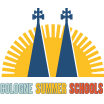
Jukka Jokela M.A. (pronouns he/him)
Project Manager Cologne Summer Schools
Telefon +49-221-470-90812 / +49-221-470-90803
E-Mail CologneSummerSchools[at]verw.uni-koeln.de
